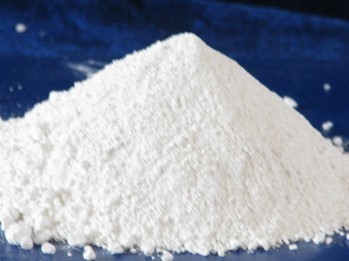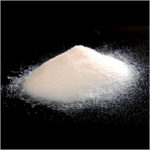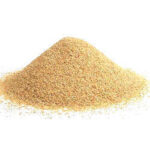Zeolite Powder(Natural)
Zeolite Powder (Natural) has several uses and applications in agriculture due to its unique properties, which can benefit soil and crop management.
Here are some of the common uses and applications of zeolite powder in agriculture:
Soil Amendment:
Soil Structure Improvement: Zeolite powder can be added to soils to enhance their structure, making them more porous and better aerated. This improves water retention and drainage, which is particularly useful in clayey or compacted soils.

Nutrient Retention: Zeolites have a high cation exchange capacity (CEC), allowing them to retain and slowly release essential nutrients like potassium, calcium, and magnesium to plants over time. This can reduce nutrient leaching and improve nutrient availability to crops.
pH Regulation:
Zeolite can help regulate soil pH, making it more suitable for certain crops. It can act as a pH buffer stabilizing the soil’s acidity or alkalinity.
Water Management:
Water Retention: Zeolite can hold water in its porous structure, releasing it slowly to plant roots. This is beneficial in regions with limited water availability or for drought-prone crops.
Water Filtration: Zeolite can be used to filter and purify irrigation water by removing impurities, heavy metals, and toxins.
Soil Remediation:
Zeolite can assist in soil remediation efforts by adsorbing pollutants and contaminants, including heavy metals and ammonia, making the soil less toxic for plants.
Livestock Farming:
Zeolite can be added to animal bedding materials to absorb odors and moisture, creating a
healthier environment for livestock and poultry.
Fertilizer Efficiency:
Zeolite can be mixed with fertilizers to improve their efficiency. It helps retain nutrients in the root zone, reducing nutrient runoff and leaching.
Pest and Disease Management:
Zeolite can be used as a carrier for beneficial microorganisms, such as mycorrhizal fungi and beneficial bacteria, which can enhance plant growth and protect against soil-borne pathogens.
Seed Coating:
Zeolite powder can be used as a component in seed coatings, helping to improve seed germination and early seedling growth by providing essential nutrients and moisture.
Hydroponics and Soilless Culture:
Zeolite can be utilized in hydroponic systems and soilless culture as a growth medium or substrate due to its water-retentive and nutrient-holding properties.
Organic Agriculture:
Zeolite is considered a natural and eco-friendly soil amendment, making it suitable for organic farming practices.
When using zeolite powder in agriculture, it’s essential to consider factors such as the ty
pe of zeolite, application rates, and the specific needs of your crops and soil. Consulting with agricultural experts or conducting soil tests can help determine the most effective and appropriate use of zeolite in your farming practices.
Zeolite Powder (Natural), which is a natural mineral composed of hydrated aluminosilicates, has a wide range of uses and applications across various industries.
Here are some common applications of natural zeolite powder:
Water Filtration and Purification: Zeolite is known for its high cation exchange capacity, which makes it effective at removing heavy metals, ammonia, and other contaminants from water. It is used in water treatment systems, aquarium filters, and industrial wastewater treatment.
Air Purification: Zeolite is used in air purifiers and HVAC systems to remove odors, volati
le organic compounds (VOCs), and other pollutants from the air. It can also help control humidity.
Agriculture: Zeolite can improve soil quality by enhancing its water retention capacity and nutrient-holding ability. It is used as a soil conditioner and can help improve crop yields.
Animal Feed: Zeolite is added to animal feed to reduce the risk of mycotoxin contamination and improve nutrient absorption in livestock.
Catalysis: Zeolite is used as a catalyst in various chemical reactions, such as in the petroleum industry for cracking and refining processes.
Detergents: Zeolite can replace phosphates in detergents, making them more environmentally friendly while still improving cleaning performance.
Construction: Zeolite can be used in the production of lightweight concrete and as a binder in construction materials.
Odor Control: It’s used in various products to control odors, such as cat litter, shoe inserts, and industrial odor control systems.
Gas Separation: Zeolite membranes are used in gas separation processes, such as the separation of nitrogen from air or the purification of natural gas.
Nuclear Waste Remediation: Zeolite can be used to immobilize and trap radioactive ions in nuclear waste, reducing the risk of contamination.
Health and Personal Care: In personal care products, zeolite is used in deodorants and toothpaste for its odor-absorbing properties.
Aquaculture: Zeolite is used in aquaculture systems to maintain water quality by removing ammonia and other pollutants.
Environmental Remediation: It can be used to remove heavy metals and other contaminants from soil and groundwater in environmental cleanup efforts.
Gas Storage: Zeolite can be used to store gases, such as hydrogen and methane, for various indu
strial applications.
Oil Spill Cleanup: Zeolite can be applied to absorb and encapsulate oil spills on water surfaces.
Battery Technology: Zeolite materials are being researched for use in advanced battery technologies, such as lithium-sulfur batteries.
It’s important to note that different types of zeolites have varying properties and are suitable for different applications. Natural zeolite powder is typically mined and processed to meet specific requirements for each application. Additionally, synthetic zeolites are also produced to tailor their properties for particular industrial needs.






